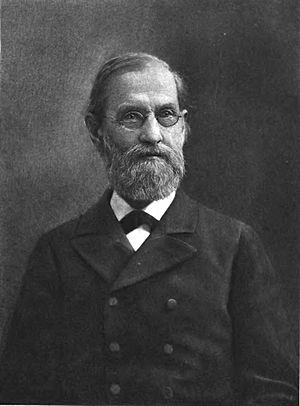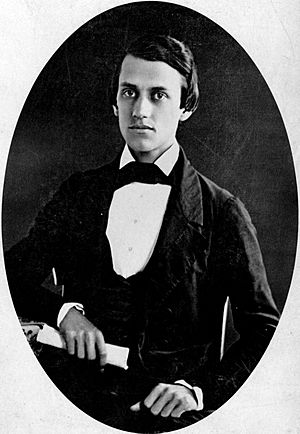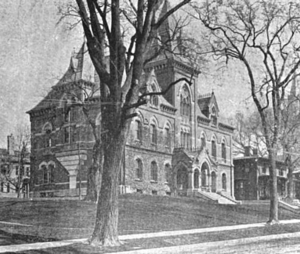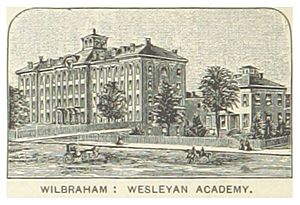William Rice (librarian) facts for kids
Quick facts for kids
William Rice
|
|
|---|---|
 |
|
| Born | May 10, 1821 |
| Died | August 17, 1897 (aged 76) |
| Nationality | American |
| Alma mater | Wesleyan University |
| Occupation | Minister, Librarian |
| Spouse(s) | Caroline Laura North |
| Children | William North Rice (b. 1845) Edward Hyde Rice (b. 1847) Charles Francis Rice (b. 1851) Caroline Laura Rice (b. 1856) |
| Parent(s) | William Rice and Jerusha Warriner |
William Rice (1821–1897) was an important person in Springfield, Massachusetts during the 1800s. He was a Methodist Episcopal minister, an author, and a librarian. From 1861 until he passed away in 1897, he was the President and Executive Director of the Springfield City Library Association.
Contents
Early Life and School Days
William Rice was born on May 10, 1821, in Springfield, Massachusetts. His parents were William Rice and Jerusha Warriner. His father was a respected businessman and public servant. The Rice family had a long history with the Methodist Church. William Rice was a descendant of Edmund Rice, who was an early settler in Massachusetts.
William Rice went to public schools in Springfield and then to Wilbraham Wesleyan Academy. He finished his studies there in 1840. From a young age, he strongly believed in ending slavery. While he was a student at Wesleyan Academy, he even started an Anti-Slavery Society. He was disciplined for this, but he continued to support the cause.
He earned a Master of Arts degree from Wesleyan University in 1853. Later, in 1876, he received a Doctor of Divinity degree. These are advanced degrees that show a lot of study and knowledge.
Serving as a Minister
William Rice became a minister in the Methodist Episcopal Church in 1841. For the next sixteen years, he served as a pastor in many different churches.
He was a pastor at these churches:
- First United Methodist Church, Melrose, Massachusetts
- Saugus, Massachusetts
- Marblehead, Massachusetts
- North Russell Street Church (later Grace Church), Boston, Massachusetts
- South Street Methodist Church, Lynn, Massachusetts
- Park Street (later Walnut Street Church), Chelsea, Massachusetts
- Chicopee, Massachusetts
- Bromfield Street Church, Boston, Massachusetts
- Park Street, Chelsea, Massachusetts (a second time)
In 1856, he was chosen to be a representative at the General Conference for his church. He spoke for the people in New England who were against slavery. He was also a representative in 1876. In that same year, he was the editor of the Methodist Hymnal, a book of church songs.
He wrote two books, mostly for other ministers. These were Moral and Religious Quotations from the Poets (1860) and Pastor's Manual (1863). Reverend Rice started to have a health problem called chronic laryngitis, which made it very hard for him to preach every week. Because of this, he moved back to Springfield in 1857.
From 1873 to 1882, he worked as a chaplain at the Hampden County House of Correction. He also led the Methodist Union of the Connecticut Valley as its president.
Leading the City Library
In 1861, William Rice became the librarian of the Springfield City Library. When he started, the library was quite small. But under his leadership, it grew a lot!
In 1871, the library moved into a new building, which was named the William Rice Building. In 1885, it became a free public library, meaning anyone could use it without paying. When he died in 1897, the library had more than 99,000 books.
William Rice also helped develop the Springfield Museums on the Quadrangle. Today, there is a "Society of William Rice" that honors people who make large donations to the museums.
He was a member of the American Historical Association. He worked to make the museums around the library a place for public education. He also served as vice president of the Connecticut Valley Historical Society and was an early member of the Massachusetts Library Club.
Passion for Education
William Rice cared a lot about education. In 1863, he was chosen to be a member of the Massachusetts Board of Education. He stayed on this board for eighteen years.
He worked especially hard to support the Westfield Normal School. He also served on the Springfield School Committee from 1865 to 1882. He was a trustee for Wesleyan University from 1875 until his death.
He joined the board of Wilbraham Wesleyan Academy in 1858. He was the secretary from 1860 to 1882, and then the president of the board from 1882 until he passed away in 1897. His son, Charles Francis Rice, took over this role after him.
Family Life
William Rice married Caroline Laura North (1819–1899) on September 13, 1843. She was the daughter of William North from Lowell. Caroline also studied at the Wilbraham Wesleyan Academy.
Caroline Laura Rice was the second president of the Springfield Home for Friendless Women and Children in the 1870s. She also wrote hymns, which are religious songs.
William and Caroline Rice had four children: William North Rice, Edward Hyde Rice, Charles Francis Rice, and Caroline Laura Rice. All four children went to Wesleyan University and earned advanced degrees. William North and Charles Francis became ministers and earned doctorates. Edward Hyde also earned a doctorate and was a high school principal. Caroline Laura earned a master's degree. William North Rice and Charles Francis Rice wrote a book together called William Rice, A Memorial in 1897, honoring their father.
Some of William Rice's grandchildren also became notable. His grandson, Paul North Rice, also became a librarian.
William Rice was a first cousin to George Washington Rice. George Washington Rice started the Massachusetts Mutual Life Insurance Company and the Springfield Five Cent Savings Bank. William Rice served as the president of the bank.
William Rice passed away on August 17, 1897. His funeral was held at Trinity Methodist Episcopal Church in Springfield, a church his family had a long connection with. He is buried in his family's plot at the Springfield Cemetery.
Genealogy
William Rice was a direct descendant of Edmund Rice, an English immigrant who came to the Massachusetts Bay Colony. Here's how they are connected:
- William Rice, son of
-
- William Rice (1788–1863), son of
- Nathan Rice (1760–1838), son of
- John Rice (1704–1771), son of
-
- Ephraim Rice (1665–1732), son of
- Thomas Rice (1625–1681), son of
-
- Edmund Rice (1594–1663)
 | Selma Burke |
 | Pauline Powell Burns |
 | Frederick J. Brown |
 | Robert Blackburn |




